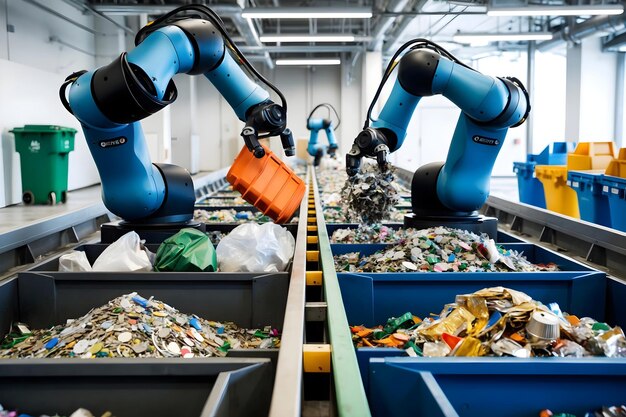AI for US Businesses: Optimizing Energy and Reducing Waste by 2026

US businesses can leverage AI by 2026 to optimize energy consumption and reduce waste through smart grids, predictive maintenance, and automated waste management systems, improving sustainability and cutting costs.
In the face of increasing pressures to optimize operations and embrace sustainable practices, how can US businesses leverage AI to optimize energy consumption and reduce waste by 2026? Utilizing Artificial Intelligence becomes not just an option but a strategic imperative for American companies aiming to lead in efficiency and environmental stewardship.
Understanding the Potential of AI in Energy and Waste Management
Artificial Intelligence is rapidly transforming numerous sectors, and its application in energy and waste management is particularly promising. By understanding how AI can be implemented, US businesses can unlock significant efficiencies and reduce their environmental impact.
The core of AI’s capability lies in its ability to analyze vast amounts of data and identify patterns that humans might miss. This analytical power drives smarter decision-making and automated processes, enhancing operational efficiencies across various industries.
AI for Smart Energy Grids
Smart energy grids enhanced by AI technologies provide a more dynamic and responsive energy distribution system. AI can predict demand fluctuations, optimize energy routing, and integrate renewable energy sources more effectively.
Predictive Maintenance in Energy Systems
AI algorithms can analyze sensor data from machinery and equipment to predict potential failures before they occur. This allows for timely maintenance, reducing downtime and extending the lifespan of critical assets.
- Reduced Downtime: Predictive maintenance minimizes unexpected equipment failures, ensuring continuous operation.
- Increased Efficiency: Optimized energy usage reduces waste and lowers operational costs.
- Extended Lifespan: Timely maintenance prevents costly repairs and prolongs the life of equipment.
- Improved Safety: Regular monitoring and maintenance enhance the safety of the workplace.
By integrating AI into energy and waste management systems, businesses can look forward to substantial savings and a more sustainable operational model. Companies that adopt these technologies early gain a competitive edge, benefiting from optimized processes and reduced environmental impact.

In conclusion, the integration of AI in energy and waste management is not just a technological advancement but a strategic necessity for US businesses aiming to enhance efficiency and sustainability. The capabilities of AI in predictive analysis and optimization provide a clear path for businesses to modernize their operations and reduce their environmental footprint.
Implementing AI in Energy Consumption Optimization
Implementing AI in energy consumption optimization can drastically change how US businesses manage their energy resources. By leveraging AI, companies can make data-driven decisions that lead to substantial energy savings and reduced waste.
The first step in implementing AI for energy optimization is collecting relevant data. This data includes energy consumption patterns, equipment performance metrics, and occupancy data. AI algorithms can then analyze this information to identify areas for improvement.
Data Collection and Analysis
Collecting and analyzing data is crucial for understanding energy usage patterns. Sensors and smart meters provide real-time data, which AI processes to uncover inefficiencies and opportunities for optimization.
Automated Energy Management Systems
Automated energy management systems use AI to adjust energy usage based on real-time conditions. This ensures that energy is used efficiently, reducing waste and lowering costs.
- Real-time Adjustments: AI systems adapt energy usage to current conditions, optimizing consumption.
- Predictive Analysis: AI forecasts energy needs, helping to avoid waste and shortages.
- Reduced Costs: Efficient energy management lowers utility bills and operational expenses.
- Sustainability: Optimized energy usage decreases the environmental impact of business operations.
With the right approach and technology, businesses can enhance their energy management practices, leading to both cost savings and environmental benefits. The application of AI in this area represents a significant opportunity for companies to improve their operational efficiency and sustainability.
In summary, the successful implementation of AI in energy consumption optimization hinges on comprehensive data collection, advanced analytical tools, and the integration of automated systems. By addressing these areas, US businesses can dramatically improve their energy efficiency, leading to substantial cost savings and a reduced environmental impact.
Reducing Waste Through AI-Driven Solutions
Reducing waste is a critical component of sustainable business practices, and AI-driven solutions offer innovative ways for US businesses to minimize waste generation and improve recycling processes.
AI can analyze waste streams to identify patterns and opportunities for reduction. This involves using computer vision to sort waste, predict waste generation, and optimize recycling processes.
AI-Powered Waste Sorting Systems
AI-powered waste sorting systems utilize computer vision to identify and separate different types of waste. This enhances the efficiency of recycling processes and reduces contamination.
Predictive Waste Generation Models
Predictive waste generation models use AI to forecast waste volumes, allowing businesses to optimize waste management strategies and reduce disposal costs.

- Improved Recycling Rates: AI enhances the accuracy and speed of waste sorting, increasing recycling rates.
- Reduced Contamination: Precise sorting minimizes contamination of recyclable materials, improving their quality.
- Cost Savings: Optimized waste management reduces disposal costs and generates revenue from recycled materials.
- Environmental Benefits: Reducing waste and promoting recycling conserves resources and protects the environment.
By adopting these AI-driven solutions, businesses can not only reduce their waste footprint but also improve their bottom line. The ability of AI to adapt and optimize waste management processes ensures that resources are used efficiently, promoting a more sustainable business model.
In conclusion, AI-driven solutions for waste reduction provide US businesses with the tools they need to minimize waste generation, improve recycling rates, and reduce disposal costs. The integration of AI into waste management processes is a strategic investment that yields both economic and environmental benefits.
Challenges and Considerations for AI Implementation
While the potential benefits of AI in energy and waste management are significant, US businesses must be aware of the challenges and considerations associated with AI implementation. Addressing these challenges is crucial for ensuring successful outcomes.
One of the primary challenges is data availability and quality. AI algorithms depend on vast amounts of data to learn and make accurate predictions. Ensuring that this data is accurate, complete, and accessible is essential.
Data Privacy and Security
Data privacy and security are critical considerations when implementing AI systems. Protecting sensitive data from unauthorized access and misuse is essential for maintaining trust and compliance.
Integration with Existing Infrastructure
Integrating AI systems with existing infrastructure can be complex and require significant investment. Ensuring compatibility and seamless operation is essential for maximizing the benefits of AI.
- Data Quality: High-quality data is essential for AI algorithms to make accurate predictions.
- Privacy Protection: Protecting sensitive data is crucial for maintaining trust and compliance.
- Infrastructure Compatibility: Ensuring that AI systems integrate seamlessly with existing infrastructure is essential for maximizing benefits.
- Cost Management: Managing the costs associated with AI implementation is important for ensuring a positive return on investment.
By addressing these challenges and considerations, businesses can improve their chances of successfully implementing AI in energy and waste management. Careful planning and execution are essential for realizing the full potential of AI.
In summary, while the implementation of AI in energy and waste management presents considerable opportunities, US businesses must carefully manage the associated challenges and considerations. By focusing on data quality, privacy protection, infrastructure compatibility, and cost management, companies can successfully harness the power of AI to optimize their operations and promote sustainability.
Case Studies of Successful AI Implementations
Examining case studies of successful AI implementations in energy and waste management can provide valuable insights for US businesses looking to adopt these technologies. Real-world examples demonstrate the potential of AI to drive significant improvements.
Several organizations have successfully integrated AI to optimize energy use and reduce waste. These case studies often highlight the innovative approaches and tangible benefits achieved through AI adoption.
AI in Commercial Buildings
Commercial buildings have implemented AI-driven energy management systems to optimize lighting, heating, and cooling. These systems reduce energy consumption and lower operational costs.
AI in Industrial Waste Management
Industrial facilities are using AI to sort and recycle waste materials more efficiently. This reduces waste sent to landfills and improves the recovery of valuable resources.
- Energy Savings: AI-driven systems optimize energy consumption and reduce operational costs.
- Waste Reduction: AI-powered sorting systems improve recycling rates and reduce landfill waste.
- Operational Efficiency: AI enhances the efficiency of energy and waste management processes.
- Sustainability: AI promotes sustainable practices and reduces environmental impact.
These case studies provide a blueprint for US businesses looking to implement AI in their operations. By learning from successful examples, companies can better understand the potential benefits and approaches to effective AI deployment.
In conclusion, examining successful AI implementations in energy and waste management provides US businesses with valuable insights and practical examples of how AI can drive significant improvements. These case studies highlight the potential of AI to optimize operations, reduce costs, and promote sustainability.
Looking Ahead: The Future of AI in Sustainable Business Practices
The future of AI in sustainable business practices is promising, with ongoing advancements set to further transform how US businesses manage energy consumption and waste reduction. As AI technology evolves, its capabilities in these areas will expand, offering new opportunities for innovation and efficiency.
AI’s ongoing evolution means that its applications in energy and waste management will become more sophisticated and widespread. Emerging trends indicate that AI will play an increasingly important role in creating sustainable business practices.
AI for Renewable Energy Integration
AI will enhance the integration of renewable energy sources into the energy grid, optimizing energy distribution and reducing reliance on fossil fuels.
AI for Circular Economy Initiatives
AI will support circular economy initiatives by optimizing resource use, reducing waste, and promoting the reuse of materials.
- Enhanced Integration: AI will improve the integration of renewable energy sources, reducing reliance on fossil fuels.
- Circular Economy Support: AI will optimize resource use and promote the reuse of materials.
- Advanced Automation: AI will enable more advanced automation of energy and waste management processes.
- Data-Driven Insights: AI will provide more detailed insights into energy and waste patterns, driving better decision-making.
By staying informed about these advancements and preparing to adopt new AI technologies, US businesses can position themselves at the forefront of sustainable business practices. The integration of AI is essential for companies looking to optimize their operations and reduce their environmental impact.
In conclusion, the future of AI in sustainable business practices offers US businesses unprecedented opportunities to optimize energy consumption, reduce waste, and promote environmental sustainability. By embracing AI and staying informed about its ongoing advancements, companies can lead the way in creating a more sustainable future.
| Key Insight | Brief Description |
|---|---|
| 💡 Smart Grids | AI optimizes energy distribution in smart grids, making it more efficient and responsive. |
| 🤖 Predictive Maintenance | AI predicts equipment failure, reducing downtime and enhancing operational efficiency. |
| ♻️ Waste Sorting | AI-powered systems accurately sort waste, boosting recycling rates and reducing contamination. |
| 📊 Data Analysis | AI analyzes extensive data to identify patterns, optimize energy use, and minimize waste. |
Frequently Asked Questions (FAQ)
▼
AI systems analyze energy consumption patterns in buildings to optimize lighting, heating, and cooling. This leads to reduced energy waste and lower operational costs through automated adjustments.
▼
AI uses computer vision to sort different types of waste, improving the efficiency of recycling processes. This decreases contamination of recycling materials and increases the recovery of resources.
▼
AI algorithms analyze sensor data from machinery to predict potential failures before they occur. This allows for timely maintenance, reducing downtime and extending the equipment lifespan.
▼
Challenges include data availability, privacy concerns, and integrating AI systems with existing infrastructure. Managing these challenges requires careful planning and robust data protection measures.
▼
Businesses can ensure data quality by implementing robust data collection and validation processes. Regular audits and data cleansing can also help maintain high data quality for accurate AI predictions.
Conclusion
In conclusion, US businesses can greatly benefit from leveraging AI to enhance energy consumption optimization and waste reduction by 2026. By understanding the applications, addressing the challenges, and implementing appropriate solutions, companies can look forward to sustainable and profitable operations in the future.





